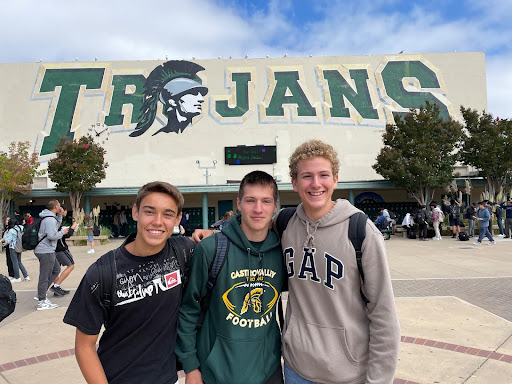Spanish Exchange Students navigate CVHS
At first glance, seniors Alberto Rodríguez and Lucas Menéndez and junior Alejandro Baixas look like average high schoolers. They joke together, struggle over some classes and play for the JV football team. What makes them so unique? These three students arrived in the US just at the end of this summer as foreign exchange students from Spain.
They will stay until early June before returning back home. For Baixas, home is the Spanish capital of Madrid, while Rodríguez comes from Almería, a city in the south. Menéndez hails from Asturias, in northern Spain.
In order to study in the US, all three students had to go through a time-consuming application process.
“You have to do a lot of paperwork,” recalled Menéndez. “You have to pay a large quantity to come here… and then you have to go to the embassy [in Madrid] to take your visa to stay all year.”
Upon arrival, the three students met on the football team and quickly became friends.
At first, joining this foreign sport was a jarring experience: “The first day, I was about to join water polo because I didn’t like [football],” joked Rodríguez. However, “once you start getting the rules and everything, it’s a nice sport.”
“It’s a cool experience to try new sports,” added Menéndez. The coaches and teammates, he gratefully noted, have received them “like family.”
In addition to new athletics, the exchange students have been adapting to the culture shock; for instance, American lunch hours are much earlier compared to Spain’s. When it comes to academics, one notable difference is the homework load; while junior and senior year are considered crucial in American schools, in Spain they are non-compulsory, meaning students have no homework and spend their time preparing for and taking exams instead.
Rodríguez also explained specific teaching differences. In Spain, education consisted of more memorization, and subject choices per grade were limited. The exchange students are now having more fun due to CVHS’ more interactive teaching style, as well as the wide variety of course options to choose from, such as civil engineering and psychology, which Rodríguez and Menéndez are enrolled in, respectively.
Lastly, all three students expressed astonishment at Trojan Stadium and the CVHS gym facilities.
“In Spain, everything is smaller,” commented Menéndez. “We don’t have the huge stadium that you have to play sports.”
Despite all the things Rodríguez, Baixas and Menéndez enjoy about Castro Valley, they are also facing their own set of challenges. Naturally, these native Spanish speakers’ first hurdle was adjusting to English.
“We’re used to using English, but not all day,” Rodríguez explained. “So it was quite difficult the first [few] days, but now it’s fine.”
Now, over one month into the school year, they generally share the same struggles as many other CVHS students: maintaining their grades in tough classes and getting through less interesting ones.
“Some of the classes are kind of boring, but that’s with every place,” Baixas laughed. “US History… trying to survive that.”
“Math [class] is the most difficult, because you do a lot of things, [that] in Spain, we don’t see,” Menéndez shared. Due to the different way material is being taught, they have to relearn much of it.
For Rodríguez, government is his most challenging course: “It’s something we have never learned, and also it’s a different country, so we don’t know about it.”
Outside of school, the exchange students enjoy spending time with their host families, visiting local cities like San Francisco and Monterey, and simply sleeping after tiring football practices.
Looking ahead, they all hope to maintain straight As and make it onto a varsity sports team at some point during the school year—“just for the jacket,” Baixas joked. He plans to try out for basketball and track and field, while Menéndez is looking forward to soccer season; Rodríguez will try out for soccer and volleyball.
As all three students navigate their first and final year at CVHS, they feel optimistic and grateful for the support from their classmates, teammates, and coaches: “I thought that because we’re from another place, they would ignore us at first,” said Baixas. “But they help you with everything you need.”


I really enjoyed this article. I never would have expected the hardest class to be government because they haven’t really known US history their whole lives. I am also glad that they are getting used to the school and everyone is treating them well.